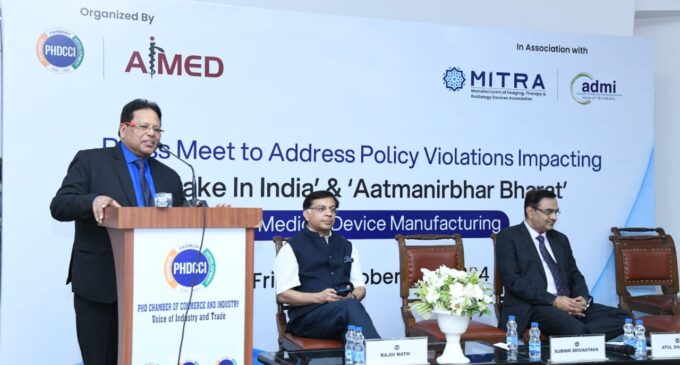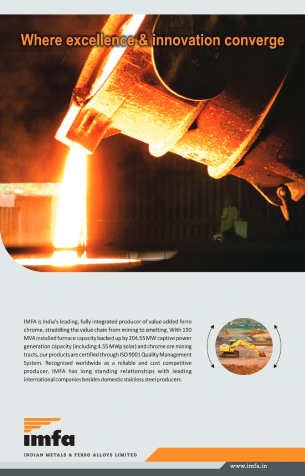MoEFCC accused of National Medical Devices Policy violations by Industry Associations

By Our Correspondent
New Delhi, Oct 27 : The PHD Chamber of Commerce and Industry (PHDCCI) and the Association of Indian Medical Devices (AiMed), in alliance with the Manufacturers of Imaging, Therapy and Radiology Devices Association (MITRA), the Association of Diagnostic Manufacturers of India (ADMI), and key stakeholders from the MedTech industry, held a press meet at PHD House to discuss serious concerns regarding recent Office Memorandums issued by the Ministry of Environment, Forest, and Climate Change (MoEFCC), the Directorate General of Health Services (DGHS), and the Ministry of Health & Family Welfare (MoHFW).
These memorandums permit the import of refurbished and pre-owned medical devices, despite similar devices being manufactured in India. Industry leaders believe this poses a significant threat to India’s self-reliance in medical device manufacturing, undermining the nation’s efforts under the Prime Minister’s vision of ‘Make in India’ and ‘Aatmanirbhar Bharat’ initiatives. This development is seen as a major setback for domestic manufacturing capabilities and India’s push toward self-sufficiency. Additionally, concerns have been raised about potential risks to patient safety, as refurbished devices may not meet the rigorous quality standards of newly manufactured equipment, further intensifying the issue.
Industry leaders stressed that this memorandum significantly undermines the domestic MedTech sector, which has experienced remarkable growth and investment in recent years under the ‘Make in India’ initiative.
Despite India’s ability to manufacture high-quality medical devices, allowing refurbished imports jeopardizes the hard-won progress made in the domestic sector. By favouring imported refurbished and pre-owned medical devices, this policy undermines the innovation and investments of Indian entrepreneurs, hindering the growth of a strong and competitive MedTech industry in India.
Moreover, there are serious concerns about safety outcomes and the quality of patient care, as refurbished devices may not adhere to the stringent safety protocols required for new devices. This could potentially compromise patient well-being and diminish healthcare delivery. The reliance on refurbished imports not only threatens the industry but also causes trauma to startups and MSMEs, leading to the potential shutdown of manufacturing units.
The Government of India’s vision to make India a global MedTech leader, with a focus on promoting innovation and export orientation, has been demonstrated in the life sciences and pharmaceutical industries.
All initiatives and efforts from various ministries aim to position India as a global destination for medical devices while reducing import dependency over time. However, the recent government orders in 2023 and 2024 allowing the import of refurbished and pre-owned devices, despite the availability of similar products manufactured in India, threaten the long-term efforts of Indian manufacturers to meet the Prime Minister’s vision of Aatmanirbhar Bharat.
Furthermore, industry experts highlight that while the industry has developed devices meeting international quality standards, which are widely used in both Indian and international healthcare institutions, it is irrational to permit refurbished medical devices to compete with locally made new products. Over the last ten years, India has shown significant growth in local content and has become export-oriented for many critical, high-end, and high-value medical devices.
Refurbished devices, which undergo repairs and cosmetic updates, cannot replicate the functionality and reliability of new equipment. New medical devices maintain optimal performance throughout their lifecycle, typically lasting around ten years, while refurbished options may show diminished functionality due to prior use. Additionally, refurbished devices often lack the latest technological advancements and come with lower warranties, inadequate service support, and higher failure rates, all of which can impact the quality of treatment and surgical outcomes.
Domestic companies, whose similar products are listed in the 2023 Office Memorandum issued by the MOEF and DGHS orders, have made representations detailing their investments, manufacturing capabilities, and employment generation, along with lists of installations in India and overseas, to the MOHFW, DOP, MOEFCC, and DGHS, both directly and through associations.
It was shocking to see a new order from the DGHS and MOEFCC in October 2024 allowing the same products without any consideration of industry requests. Additionally, the mandatory clause stating that ‘Equipment manufactured in India should not be allowed for import’ has been removed.
The Association of Indian Medical Device Industry (AiMeD) warns that imported refurbished devices are often inaccurately labelled, posing a significant risk to patient safety. The lack of clear refurbishment guidelines in India allows unscrupulous traders to import substandard equipment without proper oversight.
Visibly disappointed Mr. Rajiv Nath, Forum Coordinator, AiMeD rued the detrimental impact of this memorandum on local manufacturing, and said, “The Office Memorandum (OM) issued by the MoEFCC undermines the National Medical Devices Policy 2023, which was launched by the Honourable Prime Minister last year.
The OM allows the import of pre-owned medical equipment into India, putting the investments made by Indian and overseas manufacturers under the “Make in India” initiative at risk of becoming Non-Performing Assets (NPAs), some of which are ironically subsidised by the Government of India under its PLI scheme. This ‘two steps forward by one government department and one step backwards by another’ approach is confusing and unsettling for investors.
The investors will only bring manufacturing technologies to India if the policy environment is predictable and consistent with the National Medical Devices Policy 2023, intended to be binding on all government departments. Not only are many projects recently initiated for high-end medical equipment now jeopardised, but patient safety is also at risk.
Patients could be treated with non-calibrated, non-regulated medical equipment, compromising safety. India is being treated as a dumping ground for e-waste, with obsolete equipment being resold in the country, while overseas manufacturers benefit from doubling their sales— once through replacement sales to hospitals in the Western world and again through second sales of pre-owned equipment to India. This severely harms the domestic industry, which is still in its nascent stage. India must not become a dumping ground for obsolete medical equipment.”






